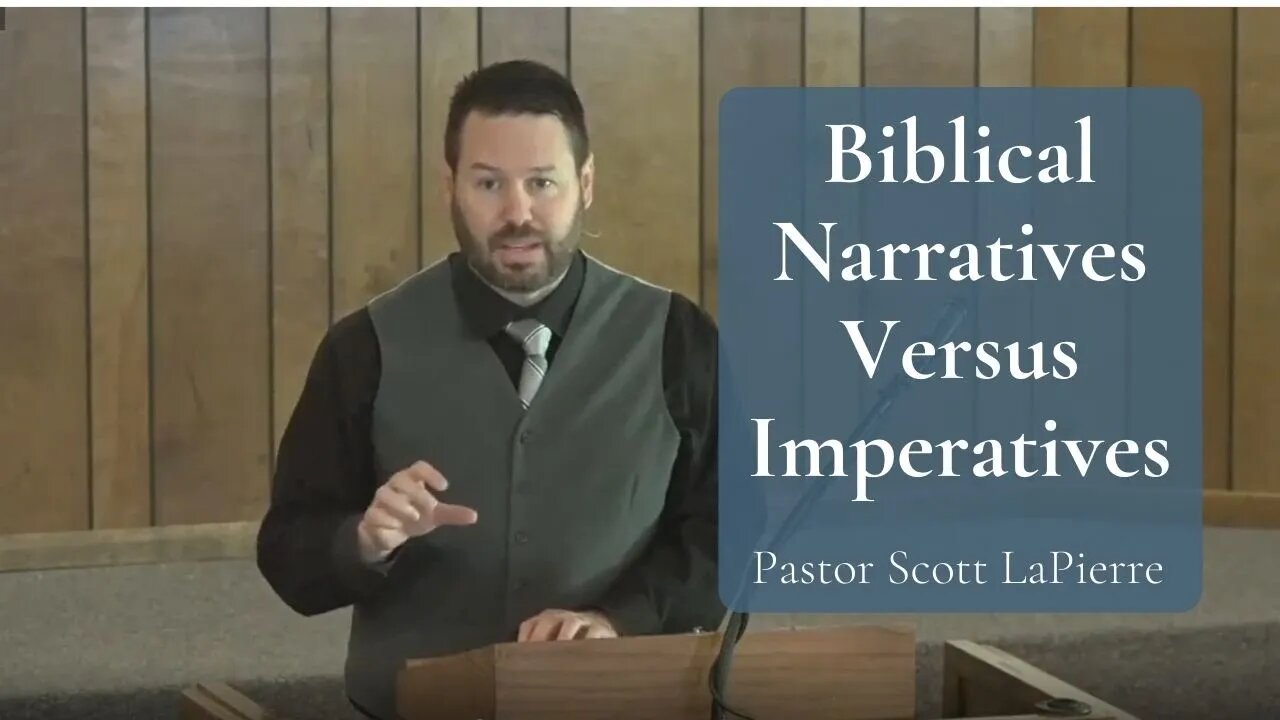Premium Only Content

Biblical Narratives Versus Imperatives - Commands in Scripture Have More Weight Than Imperatives
It is important to understand biblical narratives versus imperatives. Imperatives are commands while narratives are stories or accounts in Scripturw, which should not be given as much weight. The Coronavirus and accompanying quarantine have left many people asking, “When do we disobey?” On Wednesday, April 29th, the elders shared with Woodland Christian Church that at this point they feel led to submit to the government and appeal through letters, praying, and fasting. There might be a point at which they disobey, but they don’t believe they’ve reached that point yet.
In Pastor Scott’s first sermon, Appealing Versus Rebelling, he shared that he came to this conclusion because Christians should build their theology with imperatives (or commands, such as Romans 13, 1 Peter 2, and Titus 3) supported by narratives (or accounts) versus the other way around.
Receive a free copy of Scott's book, "Seven Biblical Insights for Healthy, Joyful, Christ-Centered Marriages": https://www.scottlapierre.org/subscribe/
For Scott LaPierre's conference and speaking information, including testimonies, endorsements, and contact info, please visit: https://www.scottlapierre.org/conferences-and-speaking/
View all of Scott's books on Amazon: https://www.amazon.com/Scott-LaPierre/e/B01JT920EQ/
Here's the accompanying podcast: https://www.scottlapierre.org/podcast/biblical-narratives-versus-imperatives/
Lesson 1: We don’t submit ____ ______ (Exo 1:15-17).
Lesson 2: __________ appealed to ______________ (Exo 3:18-19, 5:2-8).
Lesson 3: __________ appealed to ________ (1 Sam 24:4-10, 26:8-25).
Lesson 4: ____________ appealed to the ________ (Est 3:13-16, 5:1-2; 9:5, 13-14; Pro 21:1).
Lesson 5: Let’s not __________ this __________ (Dan 9:13-14).
Family Worship Guide Memory Verses: Hebrews 12:1-2
Day 1: Read Exo 3:18-19 and 5:2-8 and discuss: Do you see any similarities between the Israelites in Egypt and our current situation? Why did God send Moses to appeal to Pharaoh when He knew Pharaoh would disobey? What implications does this have for us?
Day 2: Read 1 Sam 24:4-10, 26:8-25 and discuss: Why was David convicted when he cut off a corner of Saul’s robe? What application does this have for us? Why did it look like God would want David to kill Saul? Why wouldn’t he, and what application does this have for us? Was there a point at which David “disobeyed” Saul or at least wouldn’t go along with his request? What can we learn from this?
Day 3: Read Est 3:13-16, 5:1-2; 9:5, 13-14; Pro 21:1, Dan 9:13-14 and discuss: How would you expect the Jews to respond when they learned they’d be slaughtered? How would you expect God to tell them to respond? How did Esther respond? What application does Pro 21:1 have to our current situation? How could we waste the trial we’re experiencing? How can we ensure we don’t waste it? What do you think God wants us to learn?
If invited for a speaking engagement, you can expect:
• Professionally prepared and delivered messages
• A handout with lessons and discussion questions
• Copies of Pastor Scott's books to offer as gifts to increase registrations (if you desire)
• Advertising of your event on Scott's website and social media (if you desire)
• Facebook ads and/or a Facebook event page so the event can serve as an outreach (if you desire)
• Prompt responses to any communication
• Prompt replies to phone calls, emails, and/or text messages
-
 1:32:28
1:32:28
Fresh and Fit
7 hours agoHow To Wholesale and Fix & Flip Real Estate!
55.5K9 -
 1:30:55
1:30:55
Flyover Conservatives
1 day agoDrones, Darkness, and Divine Intervention: Unpacking Prophecy and Reality - Dr. Troy Spurrill | FOC Show
32.7K1 -
 59:32
59:32
The StoneZONE with Roger Stone
5 hours agoHonoring Great American Patriots for Helping to Save our Country | The StoneZONE w/ Roger Stone
74.8K7 -
 1:09:50
1:09:50
Donald Trump Jr.
10 hours agoHow Sean Parnell Helped Deliver PA, Plus Why Pete Hegseth Must Be Confirmed | TRIGGERED Ep.199
200K87 -
 1:58:03
1:58:03
Tucker Carlson
7 hours agoJeffrey Sachs: The Inevitable War With Iran, and Biden’s Attempts to Sabotage Trump
196K310 -
 1:31:00
1:31:00
Redacted News
10 hours agoBREAKING! Trump demands answers on UFOs over America as Pentagon hides the truth | Redacted News
199K336 -
 1:07:45
1:07:45
BIG NEM
8 hours agoSpiritual STDs, Nikola Tesla & Harnessing Creative Energy! ⚡💡
34.6K2 -
 38:09
38:09
Patriots With Grit
7 hours agoWe Must Finish This Fight | Glenn Baker
27K -
 54:52
54:52
LFA TV
1 day agoWhy Did God Bring Donald Trump Back to the White House? | Trumpet Daily 12.16.24 7PM EST
43.3K9 -
 1:33:00
1:33:00
2 MIKES LIVE
14 hours ago2 MIKES LIVE #156 Author Frank Lasee will Deep Dive into CLIMATE CHANGE!
28.6K1